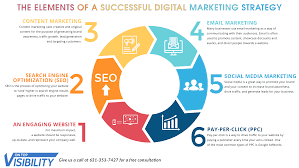The Power of PPC in Digital Marketing
Pay-Per-Click (PPC) advertising is a powerful tool in the world of digital marketing. It allows businesses to reach their target audience effectively and drive valuable traffic to their websites. PPC campaigns are a cost-effective way to promote products and services online, as advertisers only pay when their ad is clicked.
One of the key benefits of PPC advertising is its ability to provide instant results. Unlike organic search engine optimization (SEO) efforts that can take time to see results, PPC campaigns can generate immediate traffic and leads for businesses. This makes PPC an ideal strategy for businesses looking to quickly boost their online presence and drive conversions.
PPC also offers precise targeting options, allowing advertisers to reach specific demographics, locations, and interests. This level of targeting ensures that ads are shown to the most relevant audience, increasing the likelihood of engagement and conversion.
Furthermore, PPC provides valuable data and insights that can help businesses optimize their campaigns for better performance. Advertisers can track metrics such as click-through rates, conversion rates, and return on investment (ROI) to measure the effectiveness of their campaigns and make data-driven decisions.
In addition, PPC platforms like Google Ads and Bing Ads offer a variety of ad formats, including text ads, display ads, and video ads, giving advertisers flexibility in how they present their message to potential customers. This versatility allows businesses to create engaging ad experiences that resonate with their target audience.
In conclusion, PPC advertising is a crucial component of any digital marketing strategy. Its ability to deliver immediate results, precise targeting options, valuable insights, and versatile ad formats make it a valuable tool for businesses looking to increase brand visibility, drive traffic, and boost conversions online.
Top 5 Frequently Asked Questions About PPC in Digital Marketing
- What is an example of PPC?
- What is the purpose of PPC?
- What is PPC strategy?
- What is an example of a PPC?
- What is PPC in digital marketing?
What is an example of PPC?
An example of PPC in digital marketing is Google Ads, formerly known as Google AdWords. Google Ads is a popular advertising platform where businesses can create and display ads on Google’s search engine results pages and across its network of partner websites. Advertisers bid on specific keywords relevant to their products or services, and their ads are displayed to users who search for those keywords. With Google Ads, advertisers only pay when a user clicks on their ad, making it a prime example of pay-per-click advertising in action.
What is the purpose of PPC?
The primary purpose of Pay-Per-Click (PPC) advertising in digital marketing is to drive targeted traffic to a website or landing page. By displaying ads on search engines and other online platforms, businesses aim to attract potential customers who are actively searching for products or services related to their offerings. PPC campaigns allow advertisers to pay only when their ads are clicked, making it a cost-effective way to increase brand visibility, generate leads, and ultimately drive conversions. The goal of PPC is to deliver relevant and engaging ads to the right audience at the right time, maximizing the return on investment and helping businesses achieve their marketing objectives efficiently.
What is PPC strategy?
A PPC strategy refers to the comprehensive plan and approach that businesses use to create, manage, and optimize their pay-per-click advertising campaigns. It involves determining the goals of the campaign, selecting relevant keywords, setting budgets, creating compelling ad copy, and monitoring performance metrics to ensure that the campaign is meeting its objectives. A successful PPC strategy involves thorough research, constant monitoring and adjustments based on data analysis to maximize the return on investment and achieve desired outcomes such as increased website traffic, lead generation, or sales conversions.
What is an example of a PPC?
An example of a PPC (Pay-Per-Click) in digital marketing is Google Ads, formerly known as Google AdWords. Google Ads allows advertisers to create text, display, and video ads that appear on Google search results pages, websites within the Google Display Network, and YouTube videos. Advertisers bid on specific keywords relevant to their products or services, and their ads are displayed to users who search for those keywords or visit websites related to their offerings. When a user clicks on the ad, the advertiser pays a fee based on the bid amount. Google Ads is a popular PPC platform that enables businesses to reach a wide audience and drive targeted traffic to their websites.
What is PPC in digital marketing?
Pay-Per-Click (PPC) in digital marketing refers to a model of online advertising where advertisers pay a fee each time their ad is clicked. It is a cost-effective and targeted approach to promoting products and services online, allowing businesses to reach their desired audience and drive traffic to their websites. PPC campaigns are designed to appear on search engine results pages or other online platforms, and they offer businesses the opportunity to showcase their offerings to potential customers at the moment when they are actively searching for related products or services. By leveraging PPC strategies, businesses can increase brand visibility, generate leads, and drive conversions effectively in the competitive digital landscape.




